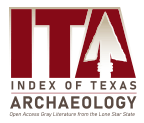Home > Research Projects and Centers > Center for Regional Heritage Research > Index of Texas Archaeology > Vol.
Agency
Texas Historical Commission
Abstract
On behalf of the Texas Department of Transportation, SWCA Environmental Consultants (SWCA) conducted an intensive cultural resources survey with systematic shovel testing from July 10–14, 2017 of new and existing right-of-way (ROW) along Farm-to-Market (FM) 45 in San Saba and Mills Counties, Texas. Because the project will receive funding from the Federal Highways Administration, it qualifies as an undertaking as defined in Title 36 Code of Federal Regulations Part 800.16(y) and, therefore, survey was conducted in compliance with Section 106 of the National Historic Preservation Act (54 U.S. Code 306108). Furthermore, the project must also comply with the Antiquities Code of Texas (9 Natural Resources Code 191). Kevin Hanselka served as Principal Investigator under Texas Antiquities Permit No. 8096.
The total area of potential effects (APE) is defined as a 12.5-mile-long stretch of FM 45 between the limits outlined above, and includes the existing 100- to 200-foot-wide ROW and an additional 84 acres of new ROW in discontinuous segments along both sides of existing ROW. The total project area is about 264.5 acres, of which about 178 acres is existing ROW, 84 acres is new ROW, and 2.5 acres is proposed easements. Typical depths of impact would range between 3 and 5 feet for pavement and vertical adjustments to the roadway profile. Maximum depths of impacts would reach up to 60 feet at bridge widening/replacement locations. Some areas would require significant (i.e., 5–15 foot) cuts in back slopes to accommodate the new roadway width.
Background research determined that two cultural resources surveys have been previously conducted within the APE. Fourteen previously recorded archeological sites and 166 potentially historic structures are located within a 0.6-mile (1-kilometer) radius of the current APE; of these, three archeological sites and three possible historic structures are located within the APE. The field investigations assessed all portions of the APE for which access was granted; however, right-of-entry was denied on 17.6 acres of new ROW. Consequently, the survey covered 246.9 acres of the total 264.5-acre APE. The investigations consisted of an intensive pedestrian survey supplemented with the excavation of 231 shovel tests and 15 backhoe trenches. The proposed ROW has been modified to varying degrees by modern land-use practices (e.g., farming and ranching) and infrastructure, but most areas are relatively intact. SWCA documented nine cultural resources, including five isolated finds, three prehistoric sites (41SS73, 41SS75, and 41MI2), and one historic archeological site (41SS197), within the FM 45 survey areas. Site 41SS197 is a historic residential site consisting of a standing chimney and artifact scatter. The artifacts included milk, clear, green and brown glass, whiteware, and miscellaneous metal. Based on information provided by the landowner, archival review, and temporally diagnostic artifact attributes, the site dates to the early through mid-twentieth century. Sites 41SS73, 41SS74, and 41MI2 are prehistoric lithic scatters with poor integrity and lacking substantial assemblages. Sites 41SS73, 41SS74, 41MI2, and 41SS197 are recommended as not eligible for the National Register of Historic Places or as State Antiquities Landmarks within the current APE. For the surveyed portion of the APE, SWCA recommends a finding of “no historic properties affected” and no further archeological investigations. Cultural resources survey is recommended on 12 currently inaccessible parcels, once right of entry is obtained.
Creative Commons License

This work is licensed under a Creative Commons Attribution-NonCommercial 4.0 International License
Included in
American Material Culture Commons, Archaeological Anthropology Commons, Environmental Studies Commons, Other American Studies Commons, Other Arts and Humanities Commons, Other History of Art, Architecture, and Archaeology Commons, United States History Commons
Tell us how this article helped you.


